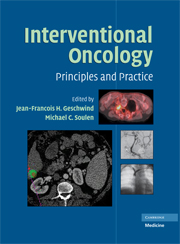Book contents
- Frontmatter
- Contents
- FOREWORD
- ACKNOWLEDGMENTS
- CONTRIBUTORS
- PART I PRINCIPLES OF ONCOLOGY
- 1 Biology of Cancer
- 2 Evaluation of the Cancer Patient
- 3 Principles of Chemotherapy
- 4 Pharmacologic Principles of Regional Therapy in the Treatment of Liver Metastases or Primary Liver Tumors
- PART II PRINCIPLES OF IMAGE-GUIDED THERAPIES
- PART III ORGAN-SPECIFIC CANCERS
- PART IV SPECIALIZED INTERVENTIONAL TECHNIQUES IN CANCER CARE
- INDEX
- Plate section
- References
2 - Evaluation of the Cancer Patient
from PART I - PRINCIPLES OF ONCOLOGY
Published online by Cambridge University Press: 18 May 2010
- Frontmatter
- Contents
- FOREWORD
- ACKNOWLEDGMENTS
- CONTRIBUTORS
- PART I PRINCIPLES OF ONCOLOGY
- 1 Biology of Cancer
- 2 Evaluation of the Cancer Patient
- 3 Principles of Chemotherapy
- 4 Pharmacologic Principles of Regional Therapy in the Treatment of Liver Metastases or Primary Liver Tumors
- PART II PRINCIPLES OF IMAGE-GUIDED THERAPIES
- PART III ORGAN-SPECIFIC CANCERS
- PART IV SPECIALIZED INTERVENTIONAL TECHNIQUES IN CANCER CARE
- INDEX
- Plate section
- References
Summary
The practice of oncology is truly a multidisciplinary, team-based endeavor. Combining the efforts of medical, radiation, surgical and interventional oncologists is crucial to optimizing the overall care of the cancer patient, and communication among these physicians is essential to formulate treatment plans for patients who typically have complicated medical issues. Interventional oncologists require the ability to conduct a thorough and comprehensive assessment of patients with a variety of malignancies and a range of associated medical problems. These basic assessment skills also promote smoother interactions among the various physicians who comprise the multidisciplinary team, and therefore will allow the interventional oncologist to play a key role in management of these patients. Evaluation of the cancer patient is composed of several fundamental principles, including medical history, physical examination, performance status grading, quality of life assessment, laboratory and data review and, ultimately, in-depth patient discussion on choices of treatment plans (1).
The physician should first elicit information regarding the patients' symptomatology, yielding as much information as possible on the progression of these symptoms and comparing current status with their initial presentation. Other components of the medical history that will be discussed in detail include history of present illness (HPI), review of systems, pertinent listing of previous medical and surgical details, review of records, hereditary and environmental factors and use of drugs and medications. Subsequently, the physician performs a relevant physical examination to obtain insight on organ dysfunction, and this provides access to obtaining additional medical history in an extremely targeted fashion.
- Type
- Chapter
- Information
- Interventional OncologyPrinciples and Practice, pp. 23 - 27Publisher: Cambridge University PressPrint publication year: 2008



